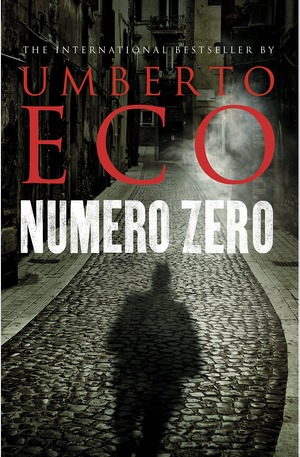
SIMON: At the heart of the story is a tipster, maybe pointedly named Braggadocio. And then, in the world, there are more losers than winners, and so (laughter) my readers can identify themselves with the characters. Also, my "Foucault's Pendulum" - main characters were, in a way, losers.ĮCO: They are more interesting than the winners.ĮCO: They give a more to psychology. Obviously, you must be a loser in order to work for a newspaper like that (laughter). SIMON: Colonna, your journalist, says I dreamed what all losers dream - about one day writing a book that would bring me fame and fortune.ĭoes being a loser make him vulnerable to saying yes to the schemes of the publisher?ĮCO: All the characters of my novel are losers (laughter). The book is "Numero Zero," and Umberto Eco, one of the best-selling authors in the world, joins us from Milan. The publisher intends only to use the paper as a vehicle to concoct nonsense, fuel fantasies and contrive conspiracy theories that could be used to blackmail people of Italy's inner sanctum of power - government, military, finance, the papacy. SCOTT SIMON, BYLINE: It's about a Roma journalist named Colonna who's recruited to run a newspaper in the Italy of 1992, a newspaper called Domani, or Tomorrow, because the day it comes out will never be. We'll visit now our last conversation with him. His final work "Numero Zero" was published last October. In this way, readers are under the impression that they are being informed about two facts, but they're persuaded to accept just one view as being more convincing.The internationally renowned Italian author Umberto Eco has died at the age of 84. The trick lies in quoting first a trivial opinion and then another opinion that is more respectable, and more closely reflects the journalist's view. So there will be two conflicting statements to show, as a fact, that there are varying opinions on a particular issue, and the newspaper is taking account of this irrefutable fact. But it might be assumed that the journalist has only quoted someone who thinks like him. Those statements, once put in quotes, become facts - in other words, it's a fact that that person expressed that opinion. And so they introduce into the piece, in quotation marks, the statements of a witness, a man in the street, someone who represents public opinion.

If they report, say, a fire or a car accident, then obviously they can't indulge in saying what they think. 'Take the major British or American newspapers.

“So, Colonna, please demonstrate to our friends how it's possible to respect, or appear to respect, one fundamental principle of democratic journalism, which is separating fact from opinion.'


 0 kommentar(er)
0 kommentar(er)
